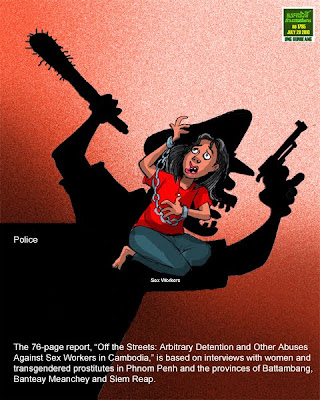By Melissa Ditmore, Independent consultant
RH Reality Check
Human Rights Watch (HRW) has released a report documenting abuses of sex workers by law enforcement in Cambodia, including rape and beatings, unlawful detention and deprivation of medical care. The report also indicates that opportunistic abuse of power is endemic: “Every sex worker that we spoke to, including children involved in such work, had paid bribes to the police at some point.”
The US government is implicated in these abuses. The US government’s Trafficking In Persons report grades nations on their responses to human trafficking. Nations that receive low marks for a few consecutive years are threatened with economic sanctions. Cambodia’s government relies on foreign aid, and the US is one of its largest donors. When sanctions loomed, Cambodia passed an anti-trafficking law that additionally criminalized sex work and police declared open season on sex workers.
This is not uncommon; it’s a pattern seen in many places. In Cambodia, where the rule of law is weak, abuses included extreme torture and even deaths in custody. In addition to detention and abuse by law enforcement, sex workers were also unlawfully detained by anti-trafficking NGOs. One bright spot is that these organizations say that they have changed their policies and HRW says that no reports of detention by NGOs have been received in 2010.
Unfortunately, abuse by law enforcement continues.
In response to these abuses, the report recommends suspending the provision against soliciting in the anti-trafficking law because the provision “gives police more leverage to extort money and commit violent acts against sex workers and has facilitated abuses.” Instead of arresting and abusing sex workers, the report recommends consulting sex workers to “jointly develop programs and services that can empower sex workers and accurately reflect their needs.”
This is the strongest language from HRW yet that criminalization of sex work contributes to violence and abuse of some of the most vulnerable people. This same sentiment was expressed yesterday by Mandeep Dhaliwhal of UNDP during the International AIDS Conference (IAC) happening now in Vienna. These recommendations are only a first step to better policy to promote and ensure the human rights of sex workers. Sex workers at the IAC have been protesting US foreign policy that prevents sex workers from being the kind of partners HRW recommends. US funding restrictions include an anti-prostitution pledge that promotes discrimination against sex workers by prohibiting empowerment programs for sex workers. But in order to combat human rights abuses of sex workers and HIV among sex workers, sex workers must be part of the solution, rather than as target populations for programs designed and implemented without input from the people they seek to affect.
The US government is implicated in these abuses. The US government’s Trafficking In Persons report grades nations on their responses to human trafficking. Nations that receive low marks for a few consecutive years are threatened with economic sanctions. Cambodia’s government relies on foreign aid, and the US is one of its largest donors. When sanctions loomed, Cambodia passed an anti-trafficking law that additionally criminalized sex work and police declared open season on sex workers.
This is not uncommon; it’s a pattern seen in many places. In Cambodia, where the rule of law is weak, abuses included extreme torture and even deaths in custody. In addition to detention and abuse by law enforcement, sex workers were also unlawfully detained by anti-trafficking NGOs. One bright spot is that these organizations say that they have changed their policies and HRW says that no reports of detention by NGOs have been received in 2010.
Unfortunately, abuse by law enforcement continues.
In response to these abuses, the report recommends suspending the provision against soliciting in the anti-trafficking law because the provision “gives police more leverage to extort money and commit violent acts against sex workers and has facilitated abuses.” Instead of arresting and abusing sex workers, the report recommends consulting sex workers to “jointly develop programs and services that can empower sex workers and accurately reflect their needs.”
This is the strongest language from HRW yet that criminalization of sex work contributes to violence and abuse of some of the most vulnerable people. This same sentiment was expressed yesterday by Mandeep Dhaliwhal of UNDP during the International AIDS Conference (IAC) happening now in Vienna. These recommendations are only a first step to better policy to promote and ensure the human rights of sex workers. Sex workers at the IAC have been protesting US foreign policy that prevents sex workers from being the kind of partners HRW recommends. US funding restrictions include an anti-prostitution pledge that promotes discrimination against sex workers by prohibiting empowerment programs for sex workers. But in order to combat human rights abuses of sex workers and HIV among sex workers, sex workers must be part of the solution, rather than as target populations for programs designed and implemented without input from the people they seek to affect.



























